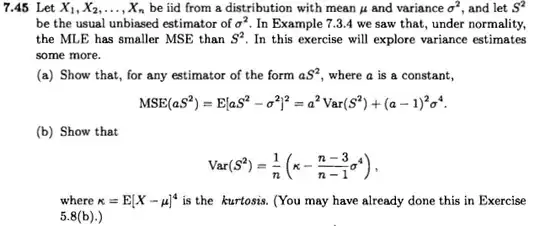In his answer to my previous question, @Erik P. gives the expression $$ \mathrm{Var}[s^2]=\sigma^4 \left(\frac{2}{n-1} + \frac{\kappa}{n}\right) \>, $$ where $\kappa$ is the excess kurtosis of the distribution. A reference to the Wikipedia entry on the distribution of the sample variance is given, but the wikipedia page says "citation needed".
My primary question is, is there a reference for this formula? Is it 'trivial' to derive, and if so, can it be found in a textbook? (@Erik P. couldn't find it in Mathematical statistics and data analysis nor I in Statistical Inference by Casella and Berger. Even though the topic is covered.
It would be nice to have a textbook reference, but even more useful to have a (the) primary reference.
(A related question is: What is the distribution of the variance of a sample from an unknown distribution?)
Update: @cardinal pointed out another equation on math.SE: $$ \mathrm{Var}(S^2)={\mu_4\over n}-{\sigma^4\,(n-3)\over n\,(n-1)} $$ where $\mu_4$ is the fourth central moment.
Is there some way that to rearranged the equations and resolve the two, or is the equation in the title wrong?

